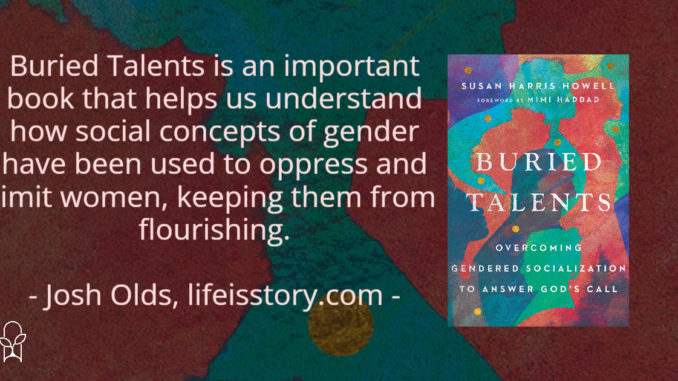
Published by IVP Academic on April 6, 2022
Genres: Academic, Non-Fiction
Buy on Amazon
Goodreads

If God is calling women to lead, what's holding them back? Susan Harris Howell has spent years helping students investigate this question. In Buried Talents, she makes clear how gender disparity in leadership is directly connected to a larger, less overt issue: gendered socialization. Howell examines gendered messages people encounter inside and outside the church in each stage of life, showing how they often create misconceptions about who women are, what they're capable of, and how they fit into God's work. As these messages pull men toward leadership, they push women away from it. God's call to leadership doesn't come in a vacuum. It comes to particular people who have, from childhood through adulthood, been shaped by subtle forms of socialization. Using social science research and interviews to explain these forces, Howell offers psychological and practical tools for both women and men to make more balanced vocational decisions. A discussion guide and suggested reading lists are also included to help readers engage and apply the content. As opportunities for women continue to expand, too many still hold back in responding to God's call. Buried Talents provides compelling guidance for how we can remove obstacles that keep women from fully using their gifts.
We’ve all seen the really cringey gender reveal parties: guns or glitter, ruffles or rifles, wheels or heels, touchdowns or tutus, bows or baskets. And most of us rightfully recognize these false binaries for the ridiculousness they are. But what’s the harm, right? According to Susan Harris Howell, the results can be devastating—especially for women. In Buried Talents: Overcoming Gendered Socialization to Answer God’s Call, Howell makes the case that we limit women and young girls when we confine them to certain types of behavior or expression.
Buried Talents begins with a deep look into the way gender socialization works in childhood, in adolescence, and in adulthood. For example, she writes about how girls might be given toy kitchen sets and dolls while boys of the same age would be discouraged against playing with “girl toys.” Thus, from the very beginning, girls are socialized into thinking that their place is in the home and that they are somehow lesser than boys. An example in adulthood might be a husband and a wife who each have their own careers, but the unspoken expectation is that the family’s life will follow the husband’s career path, not the wife’s. Howell’s research is thorough and impeccable, pointing out areas that we often don’t the problem because it’s been ingrained as a part of our thinking from childhood.
The second half of the book focuses ways on which we can break out of the limitations of gendered socialization. In particular, Howell writes to young women who are wanting to change their own thinking and the thinking of those within their sphere of influence. Howell teaches readers how to create a more accurate self-perception and encourages them to find likeminded people that can be a system of support. She also talks about simple things we can do to break the cycle, including not language that reflects gender bias.
The last chapter of the book moves into macrolevel actions that people can take—moving from changing self to changing society to prevent the stereotypes of gendered socialization. I would have liked to have seen this section expanded, or maybe even a chapter written to men to detail what they can do as men to advocate and push for equality.
Altogether, Susan Harris Howell offers readers a clear view into a part of cultural life that we may not realize is harmful. Given the increasing need to be educated on and conversant in issues of gender and sexuality, Buried Talents is an important book that helps us understand how social concepts of gender have been used to oppress and limit women, keeping them from flourishing.
